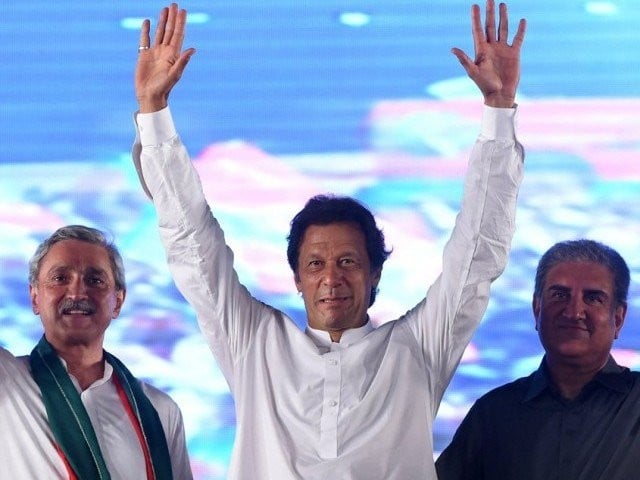
What lies behind Imran Khan’s decision to award tickets to new entrants in PTI and contesting elections on five National Assembly seats himself?

"We can’t play cricket match with a hockey team," said Chairman PTI Imran Khan at a recent press conference in Islamabad. Explaining why some of the prominent party loyalists and ideological workers were ignored in the process of ticket distribution, he said that contesting election is a science. "We can’t issue tickets to someone who is not familiar with this science."
The PTI workers have expressed dissatisfaction at the method employed to distribute tickets ahead of the expiration of deadline for the submission of nomination on June 12. They protested in Punjab, KP and Islamabad, demanding the party leadership to reconsider their decision -- of ignoring party loyalists and ideological workers and instead issuing tickets to turncoats or new entrants.
Allotting tickets to new entrants and ignoring PTI loyalists, who stood behind Imran Khan in two protests against the Sharif government during the last five years, made headlines. The PTI leaders, however, brushed aside the protests as "a storm in a teacup". "We have distributed 178 tickets so far [till the second week of June], and out of this, 104 tickets have been issued to the PTI old guard, 19 to those coming from the PPP and 18 from the PML-N and 8 from the PML-Q," says PTI spokesman, Chaudhry Fawad Hussain, while talking to TNS.
"The hue and cry we see in the media on non-party members being issued tickets is based on two assumptions that a) PTI is an ideological party; b) there are a large number of committed workers of the party, like PPP, who have been ignored," says Zaigham Khan, a senior political analyst.
Khan adds PTI is not an ideological party and the party workers have been in the party for not more than five to six years. "Imran Khan has been trying to lure electables to join his party since it was formed. He has been saying that these electables didn’t join him in the past but they are joining him now."
Interestingly, the appeal of electables for PTI reflects a new trend in party politics in Pakistan.
"In 2008, electables left PML-Q and joined PPP based on public opinion. In 2013, they turned to PML-N for the same reason," says Khan. "Presently, all the public opinion polls are favouring the PML-N yet electables are joining the PTI. This means that electables are going in one direction and public opinion in another. Does this mean there is an element of coercion in this process?" he asks.
Perhaps, Imran Khan’s image as a favourite of the establishment has a lot to do with this. Also, the fact that his opponents fell out of favour and are determinedly opposing the military establishment is another factor that has forced electables in Punjab to join the PTI.
Imran Khan is not missing any opportunity to portray himself as the hot favourite for the top political office. His decision to contest elections from five National Assembly seats reflects his strong desire to rise as a national leader. He has filed nomination papers with the ECP for two constituencies in Punjab (NA-95 Mianwali-I, NA-131 Lahore-IX), one constituency in KP (NA-35 Bannu), one in the federal capital (NA-53 Islamabad) and one in Sindh (NA-243 Karachi). "Imran Khan is contesting from three provinces because we want to give out a clear message that PTI is a party of all four provinces," says Chaudhry. "If Imran Khan campaigns in one constituency, there will be mobilisation in the adjacent constituencies as well."
Why not Balochistan? "Because there are only 18 seats of Balochistan in the National Assembly. Even if one seat goes to an outsider from this short supply of seats, there ought to be resentment among the local representatives. We want people from Balochistan to be elected on these seats," Chaudhry replies.
Traditionally, in Pakistan, top party leaders contest from more than one seat to ensure a victory on at least one seat. But in case of Imran Khan, Zaigham Khan thinks, "he is contesting from five constituencies which means he wants to prove he is a national leader and above ethnicity".
Political observers are intrigued by Imran Khan’s decision to contest from Karachi -- a city which remains in the grip of ethnic politics to this day. NA-243 Karachi comprises areas with Urdu-speaking majority that sent a Jamaat-e-Islami candidate to National Assembly in 2002, indicating that the area has a tradition of sending non-MQM candidates to National Assembly. "This is a middle class area and it is believed that Imran Khan is expecting votes from the educated-middle class voters. He has not based his election strategy on ethnicity because there is very little Pukhtun population in the area," says Moosa Kaleem, a senior journalist based in Karachi.
Khan may be hoping to set a new trend in Karachi by abandoning ethnic politics, and this may well work for him. But his party strategy in Punjab is very traditional, especially in Central and Southern Punjab. In South Punjab, he has managed to attract strong electables but in Central and Northern Punjab, strongholds of the PML-N since 1993, the ground realities are totally different. "Imran Khan has consolidated an anti-Nawaz Sharif vote under his banner," says Zaigham Khan.
Clearly, all the anti-Nawaz Sharif electables have joined PTI. Till the final count, there will be lots of speculation but, for now at least, it can safely be said that Imran Khan has taken considerable risk in contesting elections from Lahore -- considering it’s a PML-N stronghold.